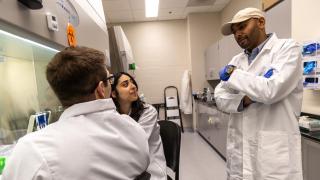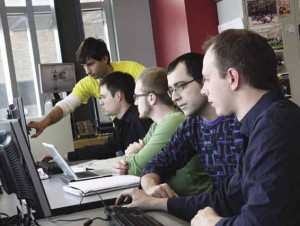
The University of Michigan-Dearborn Society of Automotive Engineers student chapter has a strong track record: Its Formula SAE team holds three consecutive top 10 placements in the annual race car design competition, which draws more than 120 vehicle entries each year.
But now the group is taking on another challenge: building an electric race car.
The idea originated when College of Engineering and Computer Science Dean Subrata Sengupta suggested that the SAE team work with the Institute for Advanced Vehicle Systems to convert one of the group's existing race cars from gas to electric power, in hopes of having the engineering students be the first American team to compete in the Formula Student Electric competition in Hockenheimring, Germany. Because it takes almost as much work to convert a car as it does to develop a new one, the students switched gears and began building a new car for the international racing competition.
However, their German racing plans were changed last week during the competition's registration process; UM-Dearborn's team is on a waiting list with 16 other teams, while 30 are officially registered. UM-Dearborn is the only U.S team out of the 46 on the list.
"It is unlikely that we will see many participating teams withdraw by the withdrawal date, which then would give us the opportunity to participate," said Roland Dibra, a co-captain of the electric car team. "We still plan on building the car this year, and will put it through enough testing to be very competitive in 2012."
When the build is complete, the team might take its car to the 2012 FSAE Hybrid International Competition, which is held at New Hampshire Motor Speedway. "There, we will have the option to put the car through its paces in a similar way that it would be raced in Germany, given that we can adjust the electric drivetrain to comply with the FSAE Hybrid competition's regulations" Dibra noted.
About 30 students--both undergraduate and graduate--are involved in building the 2011 race cars for the UM-Dearborn SAE team. In addition to engineering students, the team involves finance, business and marketing students to help build a business-case presentation for the competitions.
The UM-Dearborn team is known for building particularly cost-effective cars, but that will be more challenging with an electric car, said Geoff Turner, the team's other co-captain.
"Initially, for us, it was a mandate because our budget was small compared with other top-ten teams," Turner said. "But the electric vehicle will be immensely more expensive not only because of the batteries, but also because almost everything related to an electric powertrain is staggeringly more expensive."
To help keep costs down, the team plans to design the electric car in tandem with its more traditional, combustion-powered race car. When possible, Turner said, the team will manufacture three copies of the same part: one for the electric vehicle, one for the gas-powered vehicle, and a spare that can be used in either car in case of a malfunction.
The team is working with industry partners to help secure donations-both monetary and in-kind parts and services, Dibra said. Support for the project may come from individuals and automotive and non-automotive companies. The group's target budget is $132,000.
Dibra, who graduated in May with a bachelor's degree in mechanical engineering and engineering mathematics before starting a master's program, said the team is excited to offer students the opportunity to work on an electric race car.
"This will definitely help with job seeking if the students involved are interested in working in the automotive industry," Dibra said. "We're happy to be able to connect students with something that will help them in their future careers, while raising awareness on campus of the ongoing research in IAVS to build exciting, greener vehicles."
Story reprinted from Dearborn Engineer, a publication of UM-Dearborn’s College of Engineering and Computer Science.





